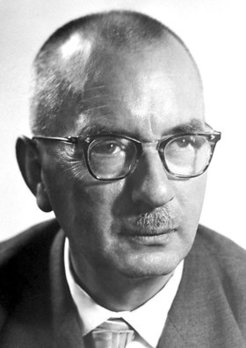Karl Ziegler (1898 - 1973)
Director 1943 - 1969

Karl Ziegler studied chemistry at the University of Marburg and graduated in 1920 under the tutelage of Karl von Auwers with a thesis on semibenzenes and related compounds. As early as 1923, he gained a “Habilitation” with work on tetra-aryl-allyl radicals and derivatives thereof. His further career took him to the University of Frankfurt and to the University of Heidelberg, where he was appointed Associate Professor in 1928. In 1936, he became Full Professor at the University of Halle and succeeded Franz Fischer as Director of the Kaiser-Wilhelm-Institut für Kohlenforschung in 1943. His most important scientific achievement dates from 1953: the discovery of organometallic catalysts, which allow polyolefins to be produced under unprecedentedly mild conditions via coordinative insertion polymerization of alkenes (“Ziegler catalysts”). This process continues to form the basis for the industrial production of plastics such as polyethylene and polypropylene; it also earned him the Nobel Prize for Chemistry in 1963, together with Giulio Natta. Other areas of interest were the chemistry of the alkali metals, radical chemistry (“Wohl-Ziegler allylic bromination”), and the synthesis of medium-sized and macrocyclic rings (“Ziegler-Ruggli dilution principle“, „Ziegler dinitrile method“). On the occasion of his 70th birthday, he endowed the “Ziegler Fund” in order to support the Max-Planck-Institut für Kohlenforschung. Together with his wife, he was a passionate collector of paintings by expressionist artists; the Ziegler collection is now part of the Mülheim Art Museum.
